State Policies and Pakistani Migrant Organisations in Toronto and New York City
Ali R. Chaudhary , Luis Eduardo Guarnizo

This paper examines how different ‘contexts of reception’ in Toronto and NYC shape the size, programmatic domain (social, cultural, economic, political), and geographic scope of action (local vs. transnational) of non-profit organisations serving the Pakistani immigrant community. Existing literature tends to employ a one-sided focus on the role of state-policies in determining the prevalence of immigrant organisations. This literature is also divided into two epistemic camps, one focusing on organisations promoting settlement/incorporation and others on transnational organisations. This study addresses these limitations by examining how state-policies, socioeconomic incorporation, community characteristics and societal attitudes combine to shape the composition of an immigrant group’s collective organisational space – comprised of incorporation and transnationally-oriented organisations. Data come from a new original database of the universe of Pakistani non-profit organisations based in Toronto and New York and from qualitative data gathered in both cities. Contrary to our expectations and previous research, we find that state-sponsored multiculturalism is not associated with a larger or more transnational Pakistani organisational space in Toronto. Rather, the size, programmatic domain and geographic scope of Pakistani organisational spaces are determined by the intersection of state-policies and the immigrant community’s socioeconomic incorporation ¬– where the more affluent New Yorker Pakistani community is associated with a larger and more transnational organisational space. Findings also reveal tensions between locally- and transnationally-oriented organisations in both cities, reflecting growing fragmentation between affluent cosmopolitan, immigrant elites and the impoverished segments of the Toronto and NYC Pakistani communities. If you would like to read a copy of this working paper please email the author: ali.chaudhary@qeh.ox.ac.uk
